Tactics of Repression
Of all civic space violations recorded by the CIVICUS Monitor over the past year, 45 percent, over 1,100 violations, were related to freedom of expression. Violations of freedoms of peaceful assembly made up 29 percent of the total, and freedom of association violations constituted 27 percent.
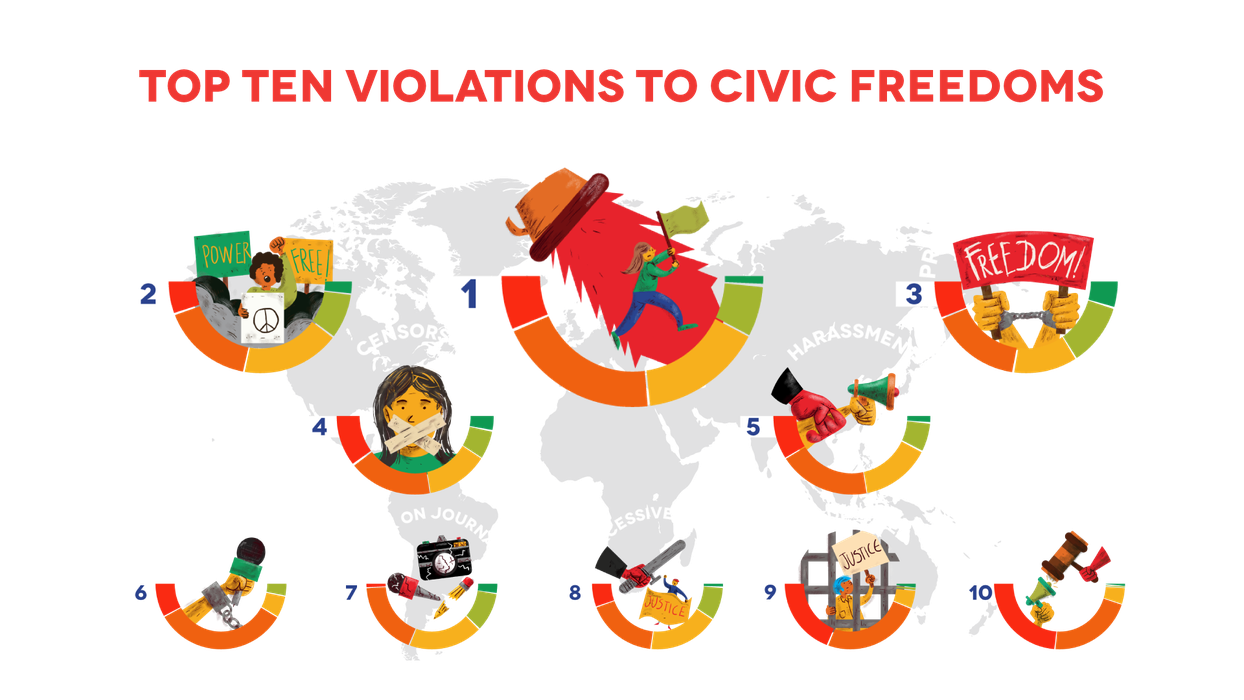
Right to protest remains under attack
As in previous years, people have taken to the streets to respond to action or inaction from authorities, demand better service delivery and accountability and protest against the high cost of living, among other reasons. The year also saw protests in many countries in solidarity with Palestinian people.
While some protests were peaceful and passed without incident, others were disrupted, prevented or dispersed by security forces, which in many cases used violence. In 2024, protests to show solidarity with people in the OPT and climate change and environmental protests were particularly targeted, including through bans, disruption of protests and arrests of protesters, among other tactics to discourage people from gathering to have their voices heard.
In 2024, detention of protesters was a common tactic used to disperse or prevent protests, documented in at least 76 countries. In Europe and Australia, climate change protesters continued to be targeted through detention. In the Netherlands, in February 2024 alone, over 1,300 Extinction Rebellion protesters were arrested for blocking roads in Amsterdam and The Hague. While some were released, others were subjected to criminal investigation. In Australia, at least 30 people were arrested in relation to protests organised by Blockade Australia against a coal terminal in Newcastle, with one protester sentenced to three months in prison in July 2024.
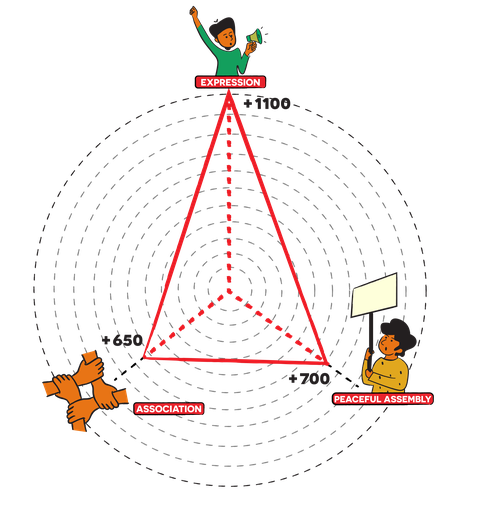
Arrests of climate and environmental protesters have not been confined to Europe and Australia. In Equatorial Guinea, 37 people were arrested and the internet was shut down on the island of Annobón following protests against the harmful impact of dynamite use in mining operations in July 2024.
Opposition protests ahead of or after elections were also subjected to violations, including detention of protesters. In Pakistan on 3 March 2024, police arrested over 100 supporters of detained opposition leader Imran Khan in rallies against alleged vote rigging in the February 2024 general election.
Authorities have also detained people for taking part in protests to criticise government actions and policies. In Argentina, at least five people were detained in Cordoba on 21 December 2023 in protests against rights restrictions and economic measures introduced by newly inaugurated far-right President Javier Milei.
Authorities also met anti-corruption protests with restrictions. In Kampala, Uganda on 23 July 2024, security forces used force and detained at least 45 protesters during protests against corruption and misuse of funds. Protesters were charged with ‘common nuisance’.
Predominantly youth-led protest movements mobilised against the high cost of living in several African countries, with authorities responding with mass detentions. In Nigeria, at least 1,700 people were arrested at #EndBadGovernance protests from 1 to 10 August 2024. In Accra, Ghana, 49 people were arrested during the first day of #OccupyJulorbiHouse protests on 21 September 2024. At least 1,200 people were arrested during #RejectFinanceBill2024 protests against tax rises in Kenya in June 2024.
Disruption of protests was documented in at least 53 countries. In at least 41, excessive force was used. Protesters were killed in several countries, including Bangladesh, Guinea, Haiti, Indonesia, Kenya, Nigeria and Pakistan.
Journalists attacked
In numerous countries, authorities are targeting free speech and using a range of tactics to silence critical and dissenting voices, including arbitrary detention and threats and intimidation of journalists. Meanwhile powerful forces continue to persecute journalists as a means of preventing information about corruption and human rights violations reaching the public. The global top violation of freedom of expression was attacks on journalists, documented in at least 49 countries. Attacks on journalists came from both state and non-state sources.
Often attacks against journalists aimed to prevent journalists covering events or came in retaliation to their reporting. In Nepal in January 2024, four police officers beat journalist Bijay Rana, editor of Eparinews, for recording a video of police baton-charging people during a festival in Baglung, Gandaki. In Liberia in March 2024, two officers from the Liberia Drug Enforcement Agency and a magistrate’s court sheriff assaulted and detained Radio Fuamah journalist Kesselee Sumo, reportedly in relation to his reporting alleging that a magistrate had unjustly detained two community leaders. In the OPT, Israel violently and deliberately targeted journalists, including through airstrikes.
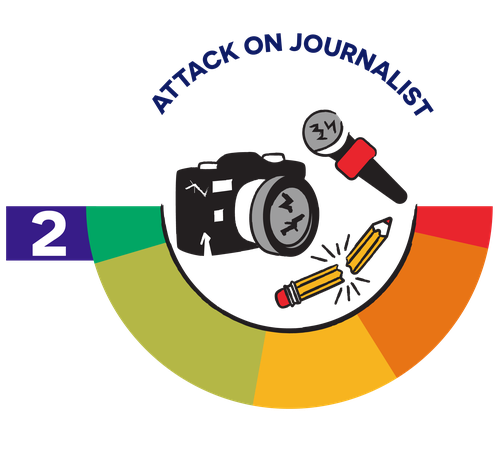
In Peru, during a transport strike in October 2024, a police officer struck a reporter with a baton after she became trapped between police lines. Despite holding her camera, displaying press credentials and verbally identifying herself as a journalist, the officer continued to hit and push her. In Madrid and Valencia, Spain, several journalists were verbally and physically assaulted between 6 and 18 November 2023 during protests against the Spanish Socialist Workers’ Party, the main party in the governing coalition, in response to the announcement of an amnesty law to pardon those involved in Catalonia’s independence bid in 2017. In the USA, a group of journalists was teargassed while reporting on the Stop Cop City march in Atlanta, Georgia. The march protested against the construction of a large police training centre in an urban forest, which protesters say will damage the environment and entrench police presence in a predominantly Black area.
Many assaults were documented of journalists while covering elections. In Bangladesh, a dozen men wearing badges of the Awami League, the then ruling party, physically attacked seven journalists, beating them with iron rods and bamboo sticks, while they covered an assault on independent candidate Ataur Rahman outside a polling station. Several pieces of equipment, including cameras and microphones, were confiscated or broken.
Ahead of the general election in December 2023 in the Democratic Republic of the Congo (DRC), around 10 members of the Union for the Congolese Nation party attacked Jerry Lombo Alauwa, a reporter for the Canal Congo Télévision TV channel and radio Liberté Kisangani, while he was covering a rally by opposition presidential candidate Moïse Katumbi. In India in May 2024, journalist Raghav Trivedi was reportedly beaten up and locked into a room by ruling Bharatiya Janata Party workers while covering home minister Amit Shah’s rally in Rae Bareli, Uttar Pradesh.
Violations against journalists are common in Afghanistan, where the Afghanistan Journalists Centre recorded at least 89 documented incidents of violence against journalists and media workers in the first half of 2024, including 60 incidents of threats and 29 arrests.
Journalists were detained in at least 58 countries over the past year. Journalists were killed in countries including Bangladesh, DRC, Honduras, Lesotho, Mexico, Myanmar and the OPT.
Human rights defenders detained
Detention of HRDs was the third most common civic space violation globally, documented in at least 58 countries. Authorities use detention as a tactic to discourage HRDs from continuing their work. HRDs working on environmental, land and Indigenous rights, labour rights, women’s rights and anti-corruption were particularly targeted.
Climate and environmental activists continued to be subject to government harassment around the world, including by arbitrary detention. In Indonesia in January 2024, environmental activist Daniel Tangkilisan was detained under the draconian Electronic Information and Transactions law for allegedly spreading hate speech on social media after raising concerns about the environmental impact of illegal shrimp farms on the island of Karimunjawa.
In Latin America, Indigenous and land rights activists are singled out for arbitrary detention and killings. In Honduras in April 2024, police officers briefly detained land defender Lilian Borjas, regional coordinator of the National Union of Farmworkers in La Ceiba, in the country’s north. The detention was related to a 2013 judicial process against Borjas due to her land rights activism against agro-industrial companies.
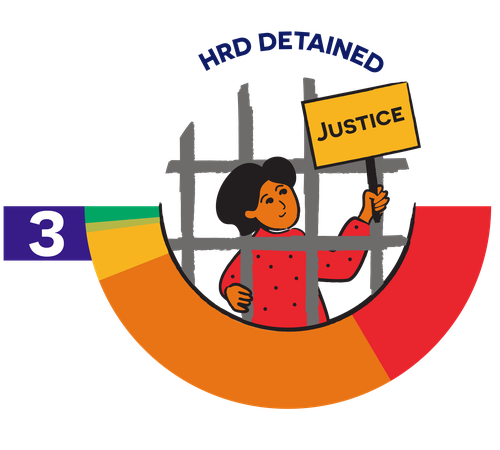
Authorities have also detained activists working for women’s and reproductive rights. In Afghanistan, Parosa Azada, a member of the Afghan Women’s Movement for Justice and Freedom, was detained in November 2024 while visiting a shop that produces signs and banners. She was released after 40 days.
Trade unionists were also targeted for their activism for labour rights. In Venezuela, police arbitrarily detained Víctor Venegas, trade unionist and president of the National Federation of Trade Unions and Schools of Education Workers in Venezuela, along with his brother, at a teacher’s assembly in Barinas in January 2024. In Mali, the arrest in June 2024 of Hamadoun Bah, secretary general of the National Union of Banks, Insurance Companies, Financial Institutions and Businesses of Mali, sparked a financial sector strike, supported by other trade unions. Bah was released on 10 June 2024.
SOLIDARITY WITH PALESTINE REPRESSED
In the aftermath of the deadly Hamas attacks on Israel on 7 October 2023 and Israel’s devastating military offensive in Gaza and Lebanon, people have mobilised in many countries to demand a ceasefire and accountability for human rights violations and show solidarity with Palestinians under attack. Journalists are working to document the reality of life in besieged Gaza, and civil society groups are pushing for an end to arms transfers to Israel and fundraising for urgent humanitarian aid.
However, many of these efforts have faced significant resistance. Almost 10 percent of all civic space violations recorded this year by the CIVICUS Monitor related to Israel and the OPT (see MENA section) and the expression of solidarity with Palestinian people.
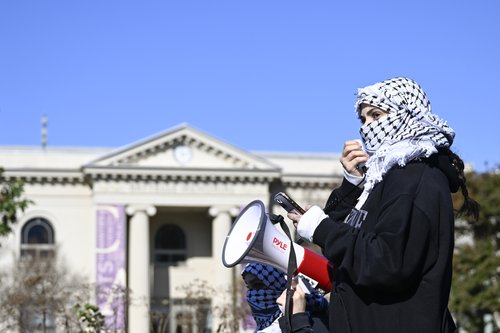
In the USA, many students have protested by setting up encampments on campuses. In response, authorities have restricted freedom of peaceful assembly, including by arresting or detaining over 3,200 people (see Americas section). In May and June 2024, federal lawmakers introduced at least eight bills targeting campus protests, including penalties for protesters, restrictions on financial aid and sanctions against universities perceived to be tolerant of protests. Many universities have approved policies banning encampments, limiting protests to specific times and locations and requiring prior approval, among other restrictions. Some universities have failed to protect students wanting to protest from harassment and credible threats of violence.
In some cases, university donors have pressured institutions to prevent protests and penalise students, and those taking part have been smeared as antisemitic. Some universities have suspended their students’ chapters of Students for Justice in Palestine, prohibiting them from holding activities, receiving funding or posting on social media. Many organisations fear for their funding and continued existence.
Freedom of peaceful assembly has also been restricted in many other countries for people wanting to gather to grieve, show solidarity with Palestinians and demand respect for international law.
Many protests have been banned in other countries, most commonly on grounds of ‘security concerns’, seen for example in France, Latvia and Singapore. Demonstrations have sometimes been authorised subject to conditions, such as moving a protest to another location, as seen in Barbados, or banning Palestinian flags, as in Fiji. Activists and academics have been barred from entering countries to attend events, as seen in Germany.
When protests have taken place, police and other security forces have in many instances used excessive force against protesters. Security forces have deployed teargas in countries including Brazil and Greece. At the University of Amsterdam, the Netherlands, in May 2024, police used batons, pepper spray, police dogs and bulldozers against protests demanding that the university cut ties with Israel-affiliated institutions.
Security forces have also removed student encampments in Poland and Portugal. In Italy, police assaulted peaceful school-age protesters with batons and in Bahrain and Germany, children have been arrested for their involvement in protests. People participating in peaceful sit-ins, road blockades and marches have been dispersed and arrested in Australia, Kenya and Sweden.
In Egypt in April 2024, activist women marching in solidarity with women in Gaza and Sudan were arrested and detained, as were two women who protested near embassies in Maldives. In Malaysia, peaceful protesters have been summoned for questioning after organising or participating in Palestinian solidarity protests. The rights of journalists covering protests have also been violated. Authorities in Jordan detained two journalists who covered a Palestinian solidarity protest in March 2024 even though they showed their press cards.
Freedom of association has been restricted through the decision of at least 18 states to suspend funding to UNRWA, the United Nations (UN) agency for Palestinian people, following allegations by Israel that 12 of its staff were involved in the 7 October attacks. Several European states, including Austria, Denmark, Finland, Germany, Sweden and Switzerland, and the European Commission, also suspended funding to Israeli and Palestinian civil society organisations (CSOs) in response to unsubstantiated allegations that they rerouted funds to terrorist groups, and amid vilification and labelling of civil society criticism of Israel as antisemitic. CSOs focusing on advocacy and education related to the OPT, and broader peacebuilding efforts, have been subject to investigation and surveillance by authorities. In Belgium, a regional minister of culture is keeping organisations that have published statements on Gaza under scrutiny.
In Germany, a partly state-owned bank froze the accounts of the Jewish anti-Zionist group Jewish Voice for a Just Peace in the Middle East and demanded a list of all its members as a ‘precautionary measure’.
Israel has killed over 180 journalists since the start of its onslaught (see MENA section). In addition, freedom of expression is being severely restricted in many countries for voices expressing solidarity with Palestinians. Journalists and media organisations worldwide have been subjected to intimidation, threats and vilification for reporting on gross human rights violations. Legitimate criticism of Israeli authorities is often conflated with antisemitism or an endorsement of terrorism.
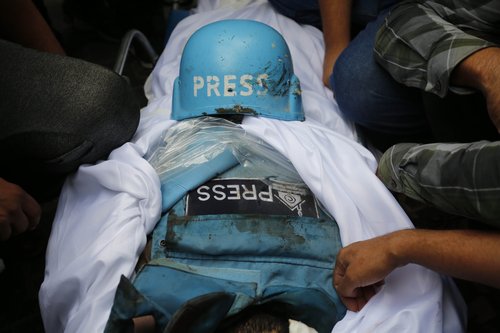
In Brazil, journalist Breno Altman faced judicial complaints that equated his anti-Zionist views to the crime of antisemitism. In the UK, British-Syrian journalist Richard Medhurst, known for his commentary on Middle Eastern issues, was detained under the Terrorism Act at Heathrow Airport in August 2024 and his equipment was seized.
Media companies in Canada and Egypt have taken retaliatory measures, including suspensions and dismissals, against their employees for posts expressing personal views about the conflict on social media. Reprisals and self-censorship can result in biased and partial coverage of and debate about the conflict, helping fuel pro-Israel disinformation and propaganda.
Activists, academics, artists and other concerned citizens face attempts to silence them when they speak out or show solidarity with Palestinians. In Canada, it is now forbidden to wear a keffiyeh scarf in Ontario’s legislative assembly and there are attempts to censor the slogan ‘From the River to the Sea’ in countries including Germany, the Netherlands and the USA. People have faced repercussions for speaking out, including dismissal, disciplinary action lacking in due process and threats of deportation for foreign nationals. In Australia, four writers who publicly opposed Israel’s assault on Gaza had their workshop contracts with the State Library of Victoria abruptly terminated. In the UK, students who have expressed solidarity with Palestinians on social media have been referred to the Prevent counter-terrorism programme or have been interrogated by the police.